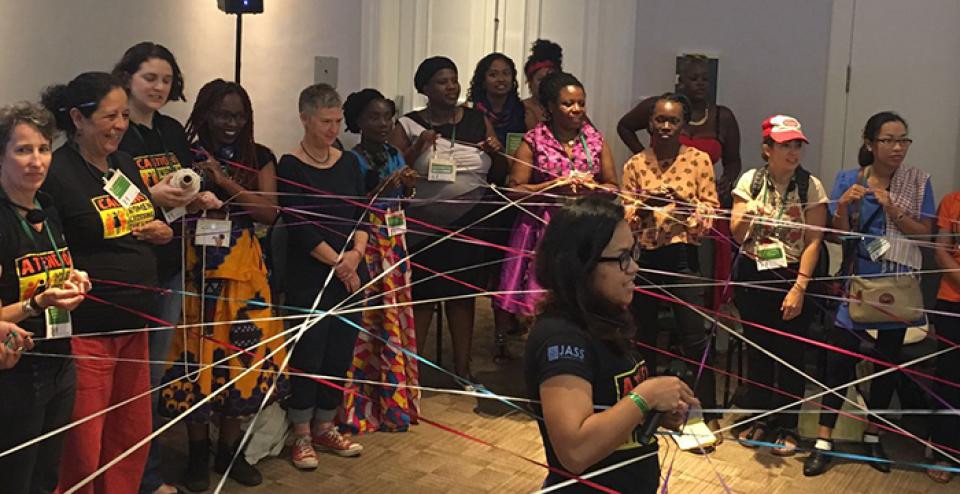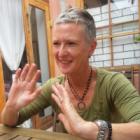
“We want movements that are effective, resilient, visible and safe.
Just Associates facilitated two events at the AWID Forum to launch new and innovative resources contributing to creative and engaged feminist movement building based on the experiences and “living movement building stories” of women’s rights activists. The session convened at the Feminist Internet eXchange Hub, showcased these two vital feminist movement building and communication resources which amplify and share activists stories and strategies to creatively use and engage with ICTs. One is We Rise – Movement Building Reimagined, a new web-based resource to make the dynamic nature of movement building more visible and accessible so others can learn from it and strengthen their own work. The second is a partnership between Just Associates Southern Africa, APC and Women’sNet that came together to build “ICTs for Feminist Movement Building: Activist Toolkit” which draws on the experience and contexts of women activists in southern Africa and beyond to assist activists to think through their communication strategies in a way that supports movement building.
As feminists, our movement building needs to be nimble and responsive to contexts, inequalities and injustices, often urgent but sometimes quieter. At the core of it is shared learnings which galvanise energies towards a collective vision of a more equal world.
As feminists, our movement building needs to be nimble and responsive to contexts, inequalities and injustices, often urgent but sometimes quieter. At the core of it is shared learnings which galvanise energies towards a collective vision of a more equal world. In our activism we move between action and listening, both fertile places for growing both strategies and dreams. The beauty and brilliance of our movements sits in many places, but perhaps what is singular and important, is the diversity of experience, of bodies, of languages, cultures of what we see, feel and interpret. Sharing these diversities through story, through listening and hearing, enables us to rise collectively in movements that are made stronger through the complex strands of difference.

We Rise – draws “..on JASS’ long-standing work with women leaders, activists and organizations in a range of countries and contexts, We:Rise takes you behind the scenes of movement building to learn from these women, the movements they are building and the transformative impacts they are having.” A web-based resource with a range of multimedia and conceptual frameworks, We Rise is rich in living stories and organised in a creative way weaving common ground, solidarity, action and solutions into JASS’s cycles of movement building.
The “ICTs for Feminist Movement Building: Activist Toolkit” is about feminist practice and how to use ICT tools to communicate in ways that make women’s voices louder and stronger. Central to the toolkit is how to develop a feminist communication strategy whilst making safe and sustainable choices amongst the array of available ICT tools. Rooted in the experience and contexts of women activists in southern Africa, the toolkit links our activism and organising that happens in person and “offline” to the tools of the online world. Especially since the online world creates powerful ways to make visible our campaigns in new and wider spaces and to engage expanded networks of people. The Activist Toolkit provides case studies and questions to help us think about how communications can help us to build movements for social justice and adopt a feminist approach to our use and understanding of ICTs.
The ICT toolkit has a political framework which unpacks and examines women’s voices and (under) representation in the media and how biased media is to black women.
During the AWID session many black women spoke to how the media represents black women as hypersexualised, how dress is policed and how important it is for feminists to disrupt and destabilise these skewed ideas through making our own media. The ICT toolkit has a political framework which unpacks and examines women’s voices and (under) representation in the media and how biased media is to black women – “Nearly every woman who shared her perspective mentioned how beauty in many post-colonial African contexts, from Nigeria to Morocco to South Africa, is always defined in relation to European ideals.” Examples of black women pushing back against these stereotypes through blogs, digital storytelling and creating safer spaces online to build solidarity and connection.
Both resources underscore the need for activists to exchange strategies, tools, creativity and politics when engaging with technology. We need to disrupt and re imagine technology from a feminist perspective.
- 7032 views






Add new comment